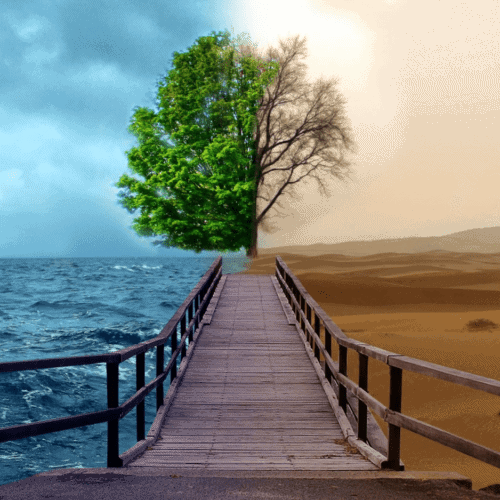Our planet Earth is covered in a huge and complex network of life known as nature. It is the whole of all things, both alive and non-living, ranging from the tallest mountains to the smallest creatures, from the bottom of the ocean to the top of the atmosphere. In addition to serving as our environment, nature serves as our teacher, our inspiration, and our home.
The importance of nature, its beauty, its contribution to human well-being, and the pressing necessity for its conservation will all be discussed in this article. Nature needs our respect and protection in all its complexity.
A. The Appeal of Nature
Nature cannot be discussed without first recognizing its unparalleled beauty. Nature is a work of art created by countless geological, biological, and climatic processes over millions of years. From the symmetrical patterns of snowflakes to the iridescent hues of tropical fish, from the quiet serenity of a forest to the blazing grandeur of a volcano explosion, its beauty is varied and unbounded.
The beauty of nature has served as a major source of inspiration for writers, poets, and painters throughout history. Ralph Waldo Emerson and Henry David Thoreau, among other transcendentalist authors of the 19th century, praised nature for its philosophical and spiritual insights. They thought that one may learn more about oneself and the cosmos by immersing oneself in the natural environment.
Nature’s beauty truly has the capacity to inspire amazement, wonder, and a deep sense of connection. Nature has a special potential to awaken our senses and carry us to a world of unadulterated joy, whether it be the sight of a sunset over the ocean, the sound of a babbling brook, or the perfume of a budding flower.
B. The Benefits of Nature to Human Welfare
Beyond only being beautiful, nature is essential to human welfare. The advantages of nature go much beyond the obvious; they have a significant impact on our mental, emotional, and physical well-being.
1. Physical Health: Time spent in natural settings might benefit one’s physical health. It promotes exercise, eases tension, and brings down blood pressure. Exposure to natural environments has been found to strengthen the immune system and possibly speed up the healing process.
2. Mental Health: The impact of nature on mental health is significant. It offers a break from the obligations and pressures of contemporary life. Spending time outside has been associated with fewer signs of anxiety and depression. The peace and quiet of nature provides a respite from the continual commotion and distractions of city life.
3. Cognitive Advantages: Nature also improves cognitive performance. It enhances problem-solving abilities, creativity, and concentration. Children who spend time in natural surroundings perform better in school and have longer attention spans, according to studies.
4. Spiritual and Emotional Health: Many people discover comfort and a spiritual connection in nature. A better comprehension of our place in the cosmos and a sense of humility can be attained through the sense of awe and amazement sparked by natural beauty. A person might discover meaning and purpose in their lives by taking time to reflect and think in nature.
C. The Need for Conservation
Despite the many advantages that nature has given us, it is currently suffering tremendous difficulties. Numerous species are in peril and the delicate balance of ecosystems is being threatened by human activities including habitat loss, pollution, and climate change. Our own activities put the very ecosystem that supports us in danger.
It is necessary, not optional, to practice conservation. It is not just a moral obligation, but also a matter of self-preservation, to protect and preserve nature. Clean air, fresh water, and fertile soil are all provided by ecosystems. Ecosystem stability and species adaptability to shifting environmental conditions depend heavily on biodiversity.
The breadth of conservation activities must be both global and varied.
1. Protected places: Creating and maintaining protected places, such as national parks and marine reserves, to protect ecosystems and offer safe havens for species is one of them.
2. Sustainable Practices: Using farming, forestry, and fishing methods that cause the least amount of environmental damage and promote long-term ecological equilibrium.
3. Education and Advocacy: Promoting environmental protection policies and practices while raising public understanding of the value of protecting the environment.
4. Climate Action: Reducing greenhouse gas emissions and promoting renewable energy sources to mitigate climate change and lessen the harm that it does to ecosystems.
5. Conservation of Biodiversity: Actions to save threatened species and safeguard biodiversity through projects like habitat restoration and breeding programs.
6. Responsibly Consuming Resources: Reducing our environmental impact by using resources more wisely and making ecologically friendly decisions on a regular basis.
Conclusion:
Our lives are enriched in innumerable ways by the inspiration, beauty, and balance provided by nature. Its beauty provides benefits for both physical and mental health in addition to aesthetic pleasure. However, human activities pose a threat to the very nature that provides for us.
We must acknowledge the immense value of nature and our responsibility to protect the environment. It is essential to practice conservation; it is not an option. We assure not just our personal well-being but also the well-being of future generations and the innumerable species we share this amazing planet with by maintaining and protecting the environment.
The famous naturalist and conservationist John Muir once said, “When we try to pick out anything by itself, we find it hitched to everything else in the Universe.” Our fate is inextricably linked to the health and vitality of nature because it is a web of interconnection. It is our responsibility to treasure, guard, and recognize the wonder and beauty of nature in all its splendor.


